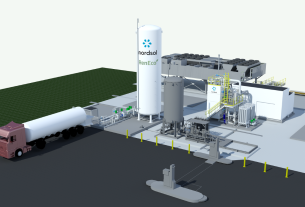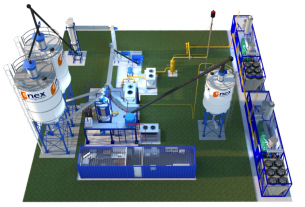Spain – At Repsol’s Cartagena refinery, work on the country’s first advanced biofuels plant has started.
Repsol will invest €200 million in this project, which will enable the supply of 250,000 tons of advanced biofuels such as biodiesel, biojet, bionaphtha, and biopropane to be used in planes, trucks, and cars without the need for engine modifications, in line with its goal of becoming a net zero emissions company by 2050. These eco-fuels will be made from waste and will help to reduce CO2 emissions by 900,000 tons per year.
For more than two decades, Repsol has been incorporating biofuels into its automotive fuels. Now, using the circular economy as a tool, the company will produce advanced biofuels from various types of waste from the agri-food industry and other sources, such as used cooking oils. Repsol will give waste that would otherwise end up in a landfill a second life by transforming it into high-value products in this way.
These advanced biofuels are a long-term solution for all modes of transportation, particularly those that have no other option for decarbonizing their operations, such as maritime, long-distance, or aviation transportation. When compared to the traditional fuels they replace, they can reduce net CO2 emissions by 65 to 85 percent.
Repsol uses the circular economy as one of its strategic pillars to develop products that have a low, zero, or even negative carbon footprint. By 2030, Repsol hopes to use three million tons of waste per year to produce two million tons of low-carbon fuels, reducing CO2 emissions by more than seven million tons per year.
Construction project
The project is being developed over a 41,500 m2 surface area in four different areas. Three of these will be inside the refinery, and will correspond to the hydrotreating unit, hydrogen production unit, and biofuel storage tank area, respectively. The fourth area will be in the Cartagena Port Authority’s facilities, where Repsol operates. This area will be equipped with the necessary infrastructure for the storage of 300,000 tons of various types of waste arriving by sea, as well as the subsequent distribution to domestic and international markets.
Following the dismantling of the refinery’s disused facilities to make way for the new units, which included the removal of 53,000 m3 of land, the focus is now on civil works. The construction of the tanks that will store the advanced biofuels, in particular, has already begun. Civil works for the installation of concrete structures and the placement of racks for the pipelines that will transport raw materials and advanced biofuels are already underway in the areas where the hydrotreatment and hydrogen plants will be located.
Repsol has spent more than €72 million on preliminary engineering, equipment commissioning, and auxiliary company labor since the project began.
European benchmark
The Cartagena refinery is one of the most important economic engines and job creators in the Murcia Region. In the industrial complex, nearly 900 highly qualified people work in highly specialized positions. In addition to direct employment, the refinery employs around 400 people on a regular basis through contractors, with this number rising to 2,000 for specific projects.
In the last ten years, Repsol has invested more than €456 million in the Cartagena industrial complex. To this amount must be added the refinery expansion project, which was inaugurated in 2012 by His Majesty King Felipe VI, then Crown Prince, and represented the largest industrial investment made in Spain, valued at €3.2 billion and putting the industrial complex at the technological forefront in its sector. The Cartagena refinery is now an industrial benchmark and one of Europe’s most efficient facilities.




